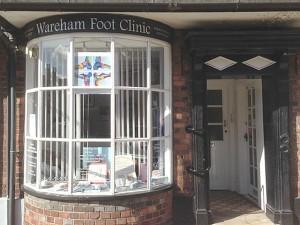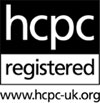About

Wareham Foot Clinic was established in July 2012 by Dr Michelle Spruce PhD who has been providing specialist and routine podiatry for the last 17 years to the local community.
The Clinic is in a Town Centre location, easily accessible by foot, car, or public transport.
Chiropodist? Podiatrist? – what’s the difference?
Nothing! The term ‘Chiropody’ has traditionally been used in the UK, but in recent years ‘Podiatry’ is more commonly used within the medical professions. ‘Podiatry’ is the internationally recognised term for the speciality of foot care.
Podiatrists undertake a 3-year full-time professional training, resulting in Registration with the Health and Care Professions Council (HCPC Reg), and membership of The Society of Chiropodists and Podiatrists (MChS).
Once qualified, all Podiatrists are required to undertake ongoing Continuing Professional Development (CPD) in order to maintain their Registration with HCPC. This involves attending training days, updates,
conferences, and reading current research and literature.
What does ‘Podiatry’ involve?
Podiatry is the branch of medicine devoted to the study, diagnosis, and treatment of disorders of the toes, foot and ankle.
Within the field of Podiatry, practitioners can focus on different specialist areas, such as:
- Surgery (of foot and ankle)
- Nail Surgery
- Sports Medicine
- Biomechanics and provision of Foot Orthoses/supports
- Diabetes Foot Care
- Rheumatoid Foot Care
- Routine ‘chiropody’ – or general maintenance of foot health and comfort.
Some foot problems will involve a single visit for assessment, treatment, and advice. Some problems will require onward referral for specialist advice. Some foot problems will require ongoing regular ‘routine chiropody’ and in this case, you would be recommended to return on a regular basis –
usually between 6 and 10 weeks.
What is ‘Routine Chiropody’?
This is the term used for general maintenance of foot health and comfort, for individuals who cannot easily self-care. This may involve nail cutting, thinning or filing, or removal of corns, callous debridement, advice on skin and nail care, and footwear advice.
What happens when I come for an appointment?
A brief medical history will be taken and a record taken of your current medications. This can be very relevant to your foot problems. We also need to know about any allergies you may have and it is helpful to know the name and contact details of your GP practice.
We offer the service of a urine test, either at your first visit, or any subsequent visit, if you would like us to check your urine to exclude one of the signs of Diabetes. If so, please bring a specimen of urine with you.
We will use an Ultrasonic Doppler to check your foot pulses, i.e to check the blood circulation to your feet, and we will check for signs of neuropathy (i.e. any loss of feeling or nerve damage in your feet). All of these tests are ‘non-invasive’ and cause no pain.
We will discuss your specific foot or toe problem and plan our treatment accordingly.
What should I bring?
Just you and your feet – plus your list of medications, if any. Also bring a specimen of urine, if you would like us to test it for Glucose. If you are attending for a Biomechanical assessment, (i.e. for a foot pain or a walking problem) please also bring your ‘usual’ shoes, plus slippers or other shoes worn frequently.
This helps if we need to think about insoles or special orthotics, which might help you.

